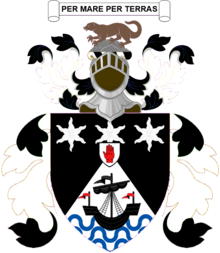Sir William Lithgow, 2nd Baronet
Sir William James Lithgow, 2nd Baronet (10 May 1934 – 28 February 2022) was a Scottish industrialist and vice-chairman of Lithgow Group. In 1952 he inherited the Scottish shipbuilding company, Lithgows, which was established by his grandfather, William Lithgow. Economic and political changes, especially the nationalisation of British shipbuilding in the 1970s, prevented Sir William from simply continuing the family business, and he therefore led it in new directions, including engineering, salmon farming and other marine and agricultural matters. He described himself as an "industrialist and farmer".[1] Since 1999 his son James has been chairman of the Lithgow Group.
Early life
[edit]Lithgow was the son of Sir James Lithgow, 1st Baronet, and Lady Lithgow, whose family homes were Gleddoch House, at Langbank on the Clyde, a few miles from their shipyards at Port Glasgow, and Ormsary, their country estate in Knapdale. He was educated at Winchester College, and was a Chartered Engineer and Fellow of the Royal Academy of Engineering. His father died when he was eighteen, and his mother acted as chairman of the family company until 1959.[2] In 1967 he married Mary Claire Hill and they have a daughter and two sons.[1]
Change of direction
[edit]In the 1960s British shipbuilding was facing serious competition from the Far East, as well as other challenges.[3] In the late 1960s a government enquiry into the UK shipbuilding industry led to a merger between Lithgows Ltd. and Scotts Shipbuilding & Engineering Co Ltd. of Greenock. This became Scott Lithgow Ltd. in 1970, but in 1977 the government nationalised the company under the control of the British Shipbuilders Corporation by the Aircraft and Shipbuilding Industries Act 1977.
Lithgow and others involved challenged the amount of compensation they were offered and ended up taking their case to the European Court of Human Rights. The press reported his views about the wider implications of his experience, which he related to the Thatcher government's privatisation policies,[4] and the forthcoming expiry of the British lease on Hong Kong.[5] When he finally lost his legal battle in 1986 he told The Times that his claim had started as a "squalid argument about money" but had come to be about "fundamental property rights which are part of the basis of the free world".[6] On other occasions he has expressed strong views publicly on subjects ranging from the importance of wealth creation to weaknesses in ferry services to the Scottish islands.
After nationalisation
[edit]Meanwhile, Lithgows was diversifying. In 1980 they moved into salmon farming through their subsidiary Landcatch. Their Campbeltown boatyard producing fishing vessels closed in 1997, but they still build fishing boats at Buckie in Moray. Engineering interests include firms producing off-road vehicles and rifles. Many of the conglomerate's interests are related to rural and coastal life, not least their land management and agricultural activities on the Ormsary estate and on the nearby Isle of Jura.
The many public bodies on which he has served include some connected with shipbuilding and agriculture, and he also has links with Strathclyde University which made him an honorary Doctor of Laws (LLD) in 1979. He was a member of the Royal Company of Archers.
In 1999, Lithgow passed on the chairmanship to his son James, around the time of his 65th birthday. At the time, the press reported his belief that many of British shipbuilding's problems in the 1960s and 1970s could be attributed to government policies stemming from the Treasury. He had apparently "seriously considered relocating to Australia".[7]
The Lithgow Group still have offices at Langbank, close to the house the first William Lithgow moved to in 1883.
Personal life
[edit]Lithgow listed his hobbies as including "rural life, invention and photography".[1] In 2006, he held an address in Western Australia,[1] but Ormsary remained his home, as well part of his title as 2nd Baronet of Ormsary.
Lithgow died on 28 February 2022, aged 87.[8]
Arms
[edit]
|
|
References
[edit]- ^ a b c d Who's Who 2006. A & C Black. 2006. ISBN 0-7136-7164-5.
- ^ The Scotsman, 4 July 1999
- ^ Connors, Duncan Philip. "British Shipbuilding 1950–1980: Trends and Developments with a case study of the Scott Lithgow Shipyard, Greenock" (PDF). Retrieved 30 January 2008.
- ^ "Lithgow warned that new shareholders might lose money in a future wave of re-nationalisation", The Financial Times, 9 July 1986
- ^ "You can hardly expect Marxists in Peking to pay decent compensation for property rights, when the Government has pleaded that no such rights exist in Britain" (Lithgow quoted in The Financial Times, 9 July 1986)
- ^ The Times, 9 July 1986
- ^ Scotland on Sunday, 4 July 1999
- ^ "Lithgow, William James, 2nd Bt of Ormsary". The Times. 4 March 2022. Retrieved 4 March 2022.
- ^ Burke's Peerage. 1959.
- Magnus Linklater (5 June 2005). "Linklater's Scotland". The Scotsman. Retrieved 30 January 2008.
- "Records of Scott Lithgow Ltd, shipbuilders, Greenock, Inverclyde, Scotland". Retrieved 30 January 2008.
- "Lithgow and others v. the United Kingdom". European Court of Human Rights. 8 July 1986. Retrieved 30 January 2008.
- "Ormsary". Who Owns Scotland?. 14 August 2005. Archived from the original on 18 March 2007. Retrieved 30 January 2008.
- Leigh Rayment. "Baronets Lees to Lithgow". Leigh Rayment's Peerage Page. Archived from the original on 1 May 2008. Retrieved 30 January 2008.
